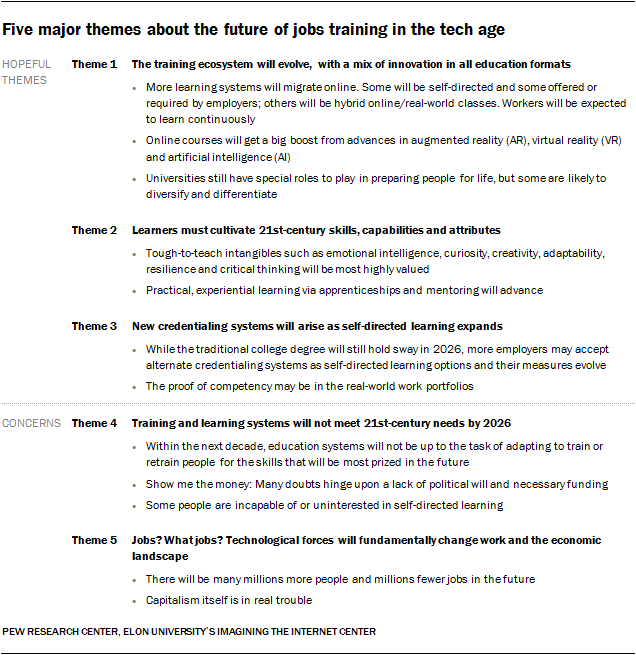A large-scale survey of technologists, scholars, practitioners, strategic thinkers and education leaders released by the Pew Research Center Wednesday found that the majority of them (70%) are optimistic that new educational and training programs will emerge and be successful in training large numbers of workers in the skills they will need to perform the jobs of the future.
Questions asked:
- What are the most important skills needed to succeed in the workforce of the future?
- Which of these skills can be taught effectively via online systems – especially those that are self-directed – and other nontraditional settings?
- Which skills will be most difficult to teach at scale?
- Will employers be accepting of applicants who rely on new types of credentialing systems, or will they be viewed as less qualified than those who have attended traditional four-year and graduate programs?
What they found:
- Most say the skills that robots and automation can’t replicate are the ones that should be developed and nurtured by education and training programs. Workers of the future should learn to deeply cultivate and exploit creativity, collaborative activity, abstract and systems thinking, complex communication, and the ability to thrive in diverse environments.
- Most think the best education programs will be the ones that teach people how to be lifelong learners.
- Apprenticeships and forms of mentoring will regain value and evolve along with the 21st‑century workplace.
- More learning systems will migrate online. Some will be self-directed and some offered or required by employers; others will be hybrid online/real-world classes.
- The “soft” skills, capabilities and attitudes respondents assume will be necessary in future workers are difficult to teach en masse or at all.
- Many workplaces place a higher value on real-world work portfolios than they do on a degree or certification, yet their hiring systems – including AI bots programmed to scan resumés – still use the commonly accepted credentials as a basis for interviewing candidates. Some respondents hope to see change.
What they said:
- Susan Price, a digital architect at Continuum Analytics: “Increasingly, machines will perform tasks they are better suited to perform than humans, such as computation, data analysis and logic. Functions requiring emotional intelligence, empathy, compassion, and creative judgment and discernment will expand and be increasingly valued in our culture.”
- Jim Hendler, a professor of computer science at Rensselaer Polytechnic Institute: “The nature of education will change to a mix of models. College education (which will still favor multi-year, residential education) will need to be more focused on teaching students to be lifelong learners, followed by more online content, in situ training, and other such [elements] to increase skills in a rapidly changing information world. As automation puts increasing numbers of low- and middle-skill workers out of work, these models will also provide for certifications and training needs to function in an increasingly automated service sector.”
- Jeff Jarvis, a professor at the City University of New York Graduate School of Journalism: “I believe that many – not all – areas of instruction should shift to competency-based education in which the outcomes needed are made clear and students are given multiple paths to achieve those outcomes, and they are certified not based on tests and grades but instead on portfolios of their work demonstrating their knowledge.”
- Ian O’Byrne, an assistant professor of literacy education at the College of Charleston: “We will identify opportunities to build a digital version of the apprenticeship learning models that have existed in the past. Alternative credentials and digital badges will provide more granular opportunities to document and archive learning over time from traditional and nontraditional learning sources. Through evolving technologies (e.g., blockchain), this may provide opportunities for learners to document and frame their own learning pathways.”
Additional findings:
The concerns: While 70% of the respondents are mostly optimistic about the future of training for jobs, they do concede to some of the concerns from the other 30% but remain hopeful.
- It may not be possible to train workers for future skills, for many reasons, including that there will not be any jobs to train them for or that jobs change too quickly.
- There is no “political will,” nor is there evidence leaders will provide funding, for mass-scale improvement in training.
- Many workers are incapable of taking on or unwilling to make the self-directed sacrifices they must to adjust their skills.
- The “soft” skills, capabilities and attitudes respondents assume will be necessary in future workers are difficult to teach en masse or at all, and they question how any teaching scheme can instill such sophisticated traits in large numbers of workers.
Related WorkingNation Solutions:
Why Ohio Communities Are Betting Big on Transforming Higher Education
How 3 Cities are Training America’s Workforce
Creating Workforce-Development Programs That Work for Everyone












